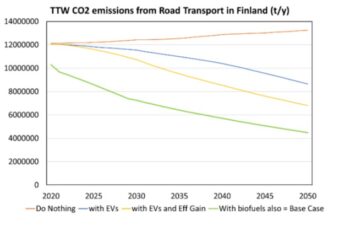New Publication – The Role of Renewable Transport Fuels in Decarbonizing Road Transport
In the light of climate change, there is an urgent need to decarbonize our societies. The road transport sector is specifically challenging, as transport demand is growing, and so are the sector´s GHG emissions. Electric mobility powered by renewable power will not be able to solve this on its own, and renewable transport fuels will be needed to bridge the gap between GHG emission reduction targets and the projected actual emissions.
A team of experts has assessed the transport sector and its projected development up to 2030 and 2050 for a number of countries, including Germany, Sweden, Finland, the USA, and Brazil. The work was initiated and carried out jointly by two Technology Collaboration Programmes of the International Energy Agency, namely the IEA Bioenergy TCP and the Advanced Motor Fuels TCP, with support of the Directorate General for Energy of the European Commission. The analysis is based on current national policies, projections of the vehicle fleet, and on the availability of renewable transport fuels.
The objective of the assessment was to quantify the role that renewable fuels play in decarbonizing the road transport sector, and to provide insights to policy makers on how individual countries differ from one another, which options for decarbonization they have, and best practice examples of successful policies.
Participants: Contracting Parties of IEA Bioenergy from Brazil, the European Commission, Finland, and USA; IEA Bioenergy Task 39; Contracting Parties of AMF from China, Finland, Germany, Japan, Sweden, and USA; AMF Annex 28, AMF Annex 59.
Major conclusions:
- Renewable fuels, in addition to all forms of electric vehicles, can make an important contribution in decarbonizing the road transport sector, especially in the short and medium term and for all modes of transport.
- Bringing the GHG emissions of the road transport sector down to zero by 2050 cannot be achieved by one measure alone.
- Countries that deploy a set of different measures such as reducing transport demand, improving vehicle efficiency, and adding renewable energy carriers such as biofuels, e-fuels, renewable electricity and renewable hydrogen have the best chances to meet ambitious decarbonization goals.
- Our assessment shows that biofuels contribute most to decarbonization now and up to 2030, 2040, or even 2050, depending on the country. In Germany, efficiency gains become the main contributor after 2030, and in Finland and Sweden the impact of biofuels remains largest until around 2040 when the use of electric vehicles takes over. In Brazil, biofuels remain the largest contributor until 2050.
A webinar to launch the report on 17 November 2020 can be viewed by clicking here
A short summary with the main conclusions is available here: IEA-Bioenergy-2-page summary-Task 41-10

Scenarios of CO2 Emissions from Road Transportation for Finland (different measures compared to ‘Current Policies’ scenario)
More elaborated reports:


